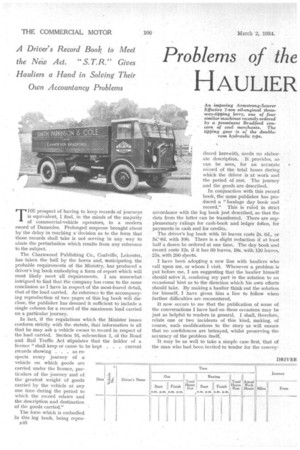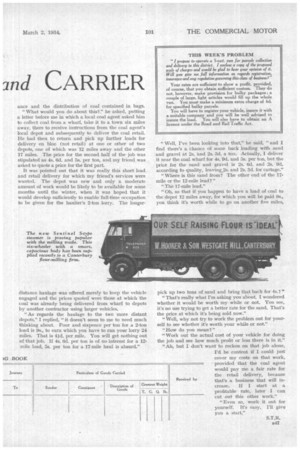Problems of the
Page 60

Page 61

If you've noticed an error in this article please click here to report it so we can fix it.
HAULIER
2nd CARRIER THE prospect of having to keep records of journeys sword of Damocles. Prolonged suspense brought about by the delay in reaching a' decision as to the form that those records shall take is not •serving in any way to
of commercial-vehicle operators, to a modern is equivalent, I find, in the minds of the majority abate the perturbation which results from any reference to the subject.
The Charnwood Publishing Co., Coalville, Leicester, has taken the bull by the horns and, 'anticipating the probable requirements of the Ministry, has produced a driver's log book embodying a form of report which will most likely meet all requirements. I am somewhat intrigued to find that the company has come to the same conclusion as I have in respect of the most-feared detail, that of the load carried. As reference to the accompanying reproduction of two pages of this log book will diSclose, the publisher has deemed it sufficient to include a single column for a record of the maximum load carried on a particular journey. In fact, if the regulations which the Minister issues conform strictly with the statute, that information is all that he may ask a vehicle owner to record in respect of the load carried. Section 16, sub-section 1, of the Road and Rail Traffic Act stipulates that the holder of a licence "shall keep or cause to be kept . . . current records showing . . . as respects every journey of a vehicle on which goods are carried under the licence, par
ticulars of the journey and of '26
Date
the' greatest weight of goods Driver's Name
carried by the vehicle at any one time during the period to which the record relates and the description and destination of the goods carried."
The form which is embodied in this log book, being repro1346 duced herewith, needs no elaborate description. It provides, as
can be seen, for an accurate re-cord of the total hours during which the driver is at work and the period of rest. The journey and the goods are described.
In conjunction with this record book, the same publisher has produced a "haulage day book and record." This is ruled in strict accordance with the log book just described, so that the data from the latter can be transferred. There are supplementary rulings for cash-book and ledger folios, for payments in cash and for credits.. The driver's log book with 50 leaves costs 2s. 6d., or 3i.'• 6d. with 100. There is a slight reduction if at least half a dozen be ordered at one time. The day book and record costs 125. if it has 60 leaves, 18s. with 120 leaves, 25s. with 200 sheets.
I have been adopting a new line with hauliers who call upon me, or whom I visit. Whenever a problem is put before me, I am suggesting that the haulier himself should solve' it, confining my part in the solution to an occasional hint as to the direction which his own efforts should take. By making a haulier think out the solution for himself, I have given him a line to follow when further difficulties are encountered.
It now occurs to me that the publication of some of the conversations I have had on these occasions may be just as helpful to readers in general. I shall, therefore, relate one or two incidents of this kind, making, of course, such modifications to the story as will ensure that no confidences are betrayed, whilst preserving the accuracy of the problem itself. It may be as well to take a simple case first, that of the man who had been invited to tender for the convey ance and the distribution of coal contained in bags.
"What would you do about this?" he asked, putting a letter before me in which a local coal agent asked him• to collect coal from a wharf, take it to a town six miles away, there to receive instructions from the coal agent's local depot and subsequently to deliver the coal retail. He had then to return and pick up further loads for delivery en bloc (not retail) at one or other of two depots, one of which was•12 miles away and the other 17 miles. The price for the second half of the job was stipulated as 4s. 6d. and 5s. per ton, and my friend was asked to quote a price for the first part.
It was pointed out that it was really this short lead and retail delivery for which my friend's services were wanted. The depot was new and only a moderate amount of work would be likely to be available for some months until the winter, when it was hoped that it would develop sufficiently to enable full-time occupation to be given for the haulier's 2-ton lorry. The longer
distance haulage was offered merely to keep the vehicle engaged and the prices quoted were those at which the coal was already being delivered from wharf to depots by another contractor using larger vehicles.
"As regards the haulage to the two more distant depots," I replied, "it doesn't seem to me to need much thinking about. Four and sixpence per ton for a 2-ton load is 9s., to earn which you have to run your lorry 24 miles. That is 41d. per mile. You will get nothing out of that job. If 4s. 6d. per ton is of no interest for a 12mile lead, 5s, per ton for a 17-mile haul is absurd." "Well, I've been looking into that," he said, "and I find there's a. chance of some back loading with sand and gravel at 2s. and 2s. 3d. a ton. Actually, I deliver it near the coal wharf for 4s. 9d. and 5s. per ton, but the price for the sand and gravel is 2s. 6c1. and 2s. 9d. according to quality, leaving_2s. and 2s. 3d. for cartage."
"Where is this sand from? The other end of the 17-mile or the 12-mile lead?"
"The 17-mile lead."
"Oh, so that if you happen to have a load of coal to the depot 12 miles away, for which you will be paid 9s., you think it's worth while to go on another five miles, pick up two tons of sand and bring that back for 4s.? "
"That's really what I'm asking you about. I wondered whether it would be worth my while or not. You see, it's no use trying to get a. better rate for the sand. That's the price at which it's being sold now."
"Well, why not try to work the problem out for yourself to see whether it's worth your while or not."
"How do you mean?"
" Work out the actual cost of your vehicle for doing the job and see how much profit or loss there is in it."
" Ah, but I don't want to reckon on that job alone, I'd be content if I could just cover my costs on that work, • provided that the coal agent would pay me a fair rate for the retail delivery, because that's a business that will increase. If I start at a. profitable rate, later I can cut out this other work." "Even so, work it out for yourself. It's easy. I'll give you a start."




























































































